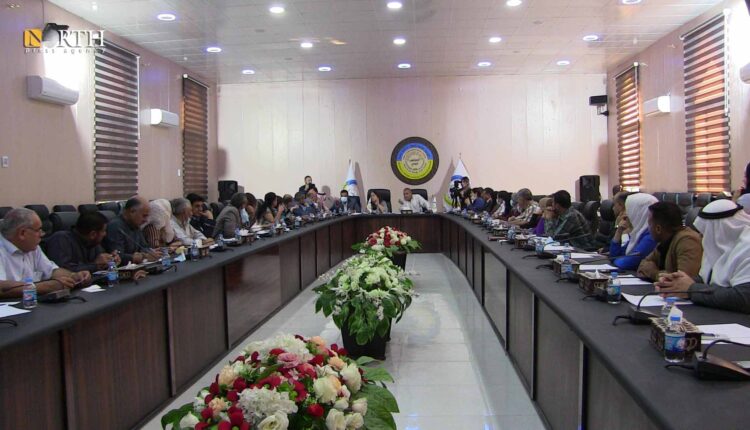
By Zana al-Ali
RAQQA, Syria (North Press) – Turkish shelling and targeting of infrastructure and service facilities of areas held by the Autonomous Administration of North and East Syria (AANES) is resuming regularly. This has a detrimental effect on the region’s population, endangering their security and stability, while international silence persists regarding these continuous attacks.
In the first half of January, Turkey targeted 89 sites with 122 strikes, including 62 by drones and 22 by warplanes.
Turkish airstrikes primarily focused on electricity and fuel production stations and substations, as well as checkpoints of the Internal Security Forces of North and East Syria (Asayish). The airstrikes also targeted four security and military sites of the Syrian government forces.
Meanwhile, the region’s population continued to endure severe humanitarian conditions, such as a shortage of water, a complete power outage, and limited availability of oil. All of this is happening amidst complete international silence, including from the United States, the key ally of the Syrian Democratic Forces (SDF) in combating the Islamic State (ISIS) in northeast Syria.
Given the prevailing instability and the apparent silence from the international community, a crucial question arises regarding the viable options for the AANES and whether it should reconsider its current alliances.
U.S. will not withdraw
Ahmad al-Durzi, a political activist, believes that the U.S. will not withdraw from the region in any way, stressing that ‘maintaining a presence in the region is a primary objective, and fighting ISIS is merely a pretext.
In an interview with North Press, al-Durzi added that Turkey only acts with the American green light because Turkey is crucial to the American’s strategy, particularly following the Gaza war.
He further suggested that Turkey’s potential support for Palestine is driven by a desire to accommodate Hamas and align with its political agenda.
According to al-Durzi, these understandings present a great opportunity for a fresh perspective on the relationship with all parties involved in the Syrian issue, distinguishing between those causing the least harm and those offering the greatest benefits to the future of the Kurdish population in Syria.
Al-Durzi believes that seeking understanding and compromise with the Syrian government can serve the Kurdish cause more effectively than any other approach. He argued that this approach provides greater clarity and alignment compared to the broader Western system, which, in his view, bears responsibility for the region’s numerous calamities, from Palestine to the Kurds who have been deprived of their rights.
Despite the Turkish shelling in Northeast Syria, which violated Syria’s sovereignty, the government seemingly treated the attacks as unrelated to the matter.
However, this silence has raised concerns among observers and activists. Hussein Nasso, a Syrian human rights activist, said in previous statement to North Press that this silence reflects the implicit intention of the Syrian government to weaken and manipulate the Autonomous Administration.
This suggests that the government’s lack of response may be a deliberate strategy to undermine the region’s governance and maintain control.
Uncertain possibilities
Muafaq Nairbiyeh, a Syrian politician held various positions in the Syrian opposition, suggested that the airstrikes conducted thus far may be overshadowed by uncertain future possibilities. These ambiguous developments could pose a significant threat to the stability of the U.S.-Turkish security relationship, particularly in light of the recent F-16 aircraft deal.
In an interview with North Press, Nairbiyeh further explained that these developments could either contribute to regional stability or come at its expense.
“To address the inherent dangers in the current situation and the overall context, a reevaluation of the strategies followed by the Syrian Democratic Council (SDC) and the Autonomous Administration is crucial,” he suggested, noting to the necessity of intra-Kurdish dialogue, and dialogue with all political parties in Syria.
All this, according to Nairbiyeh, to develop an alternative strategy to counter the current Turkish trajectory, which seeks to exacerbate the existing state of destruction.
Occupying Syrian territories
The AANES has faced accusations from the Syrian government, alleging it to be a separatist entity aiming to annex Syrian territories and exploit its resources. However, the AANES, represented by the SDC, has consistently demonstrated through its policies that its main objective is to prioritize the security, stability, and well-being of the region, while ensuring the protection of the diverse communities residing in Northeast Syria.
Hamdan al-Abd, Deputy Co-Chair of the Executive Council of the AANES, has emphasized that the AANES has never posed a threat to any group or neighboring country. Its primary focus has always been on preserving the security and stability of the region.
Furthermore, al-Abd highlighted that the AANES actively participates in international forums to uphold Syrian sovereignty. He stressed the significance of Damascus assuming its responsibility in this matter.
According to al-Abd, Turkey seeks to fulfill expansion projects and military objectives by occupying different areas in the northwest and northeast parts of Syria.
He further explained that Turkey aims to annex Syrian territories under the pretext of protecting its national security and combating the PKK. Turkey has been constructing walls and digging tunnels, including a recent 15-kilometer-long barrier between Sere Kaniye (Ras al-Ain) and Tel Abyad, indicating its intentions to seize these lands and incorporate them into the province of Urfa.
When commenting on the U.S. stance towards Turkish airstrikes, al-Abd said that “international interests are coming first.” He pointed out that the United States’ level of concern is insufficient, as Turkey’s actions have devastated livelihoods and infrastructure in the region, amounting to war crimes under international law. Therefore, the U.S. should adopt a stronger stance and approach towards Turkey’s attack.
In the midst of these tensions, violations, and attempts to displace the original population, the deputy co-chair emphasizes that the AANES “must rely on the unity of the people and gain their acceptance.”
Al-Abd called upon the international community and the U.N. to fulfill their responsibilities towards the encroachments upon Northeast Syria, which is currently a besieged area in dire need of economic support to reconstruct the remaining infrastructure destroyed by Turkish airstrikes.
